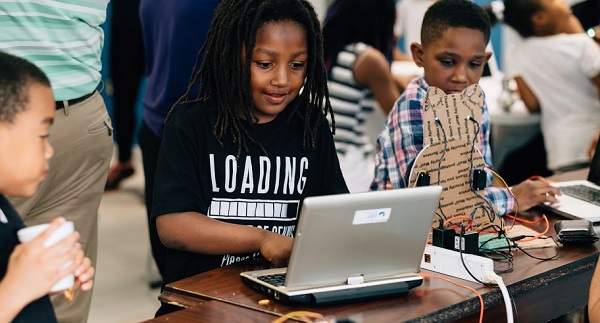
CS for PGH pushes kids to picture their future as computer scientists
Above photo by Ben Filio, courtesy of Remake Learning.
It’s no secret that kids are tech-savvy, having grown up with cell phones, tablets and video games. But familiarity with devices doesn’t always translate into knowledge.
There’s a clear need for increased emphasis on computer science studies in schools. Colleges aren’t keeping up with the projected demand for computer scientists. Part of the reason for the disparity is the shortage of computer science classes offered in high school.
To combat the issue, Remake Learning is promoting an initiative called CS for PGH (ComputerScience for Pittsburgh) that fosters education about computer science and computational thinking. A number of impressive stakeholders have joined the drive (see below for programming), including Carnegie Mellon University, Pittsburgh SuperComputing Center and Simcoach Games.

The goal of CS for PGH is to make computer science, if not a dedicated part of school curricula, at least incorporated into math programs, says LaTrenda Leonard Sherrill, who leads the Pittsburgh Regional STEM Ecosystem for Remake Learning.
Currently, no mandates exist for schools to provide such classes.
“The schools look to the state for guidance at the state level for what they should be doing,” Leonard Sherrill says. “If there aren’t any state requirements … then they don’t have to do it.”
But there is hope for kids in Pennsylvania. The legislature allocated $30 million through the PA Smart initiative for computer science education. The state also determined that computer science classes can be substituted for math classes for high school graduation requirements, and adopted a computer science framework developed by the Computer Science Teachers Association as guidance for implementing computer science curricula.
“I think we’re catching up to what makes sense,” Leonard Sherrill says. She points to the thought process of logic and discovery that computer science instills. “That’s what STEM does. It teaches you can fail and try again, and that’s when innovation happens.”
While CS for PGH will target all students, two groups are of special concern: girls and minorities.
“We have to acknowledge that computer science has not been accessible to all learners,” Leonard Sherrill says.
More diversity can be achieved by changing the image of what a computer scientist looks like to include women and minorities, she says. It’s also essential to offer computer science earlier in schools.
“High school is a great place to onboard students,” says Leonard Sherrill, but elementary school is even better. “We want to get them to computationally think, as opposed to just doing some code. A huge piece of it is starting early so students can then see themselves as computer science professionals.”
Where to find CS for PGH programming:
Carnegie Mellon University will offer 10-week sessions of middle school programming workshops through its Expanding Teknowledge program.
Partner4Work will provide 100 young adults who dropped out of school or are at risk of dropping out, with computer science skills.
The Pittsburgh SuperComputing Center, through Project GCODE, will introduce basic programming concepts to 60 girls from the 6th to 12th grades.
Simcoach Games will provide 10,000 game downloads to connect students to training, apprenticeships, and employment opportunities through in-school and out-of-school programs.
The Allegheny Intermediate Unit will distribute $375,000 in STEAM Catalyst Grants during the 2018-19 school year to 23 regional school districts with a focus on coding across the curriculum.
Carnegie Library of Pittsburgh, in collaboration with the Pittsburgh International Game Developers Association, will hire mentors to provide after-school computer science education to 27,000 students from 7th to 12th grade and will create coding and robotics kits for CLP’s 19 library locations.